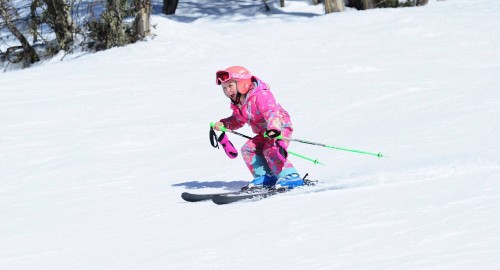Skiers Essentials
FORM THE FOUNDATION
Skiers are motivated by the desire to have fun with friends and family while skiing during the Skier Essentials stage. Skiers are beginning to develop their self-esteem that is nurtured through the reinforcement of their effort, creativity, enjoyment and learning new skills.
The introduction of basic concepts of sportsmanship, fair play, teamwork, and rules of the game occurs while fostering their passion for skiing.
- Boys 6-9
- Girls 6-8
- Snow Stars 1-5
- Club Level
- Local Club and Inter-club skill events

Key Message
Athletes
Have fun while being physically active with your friends and family while skiing and participating in complementary sports. Aim to improve concentration, focus, and imagery skills. Share and talk about your experiences with your friends and family. Use positive self-talk and positive action statements to foster a growth
Coaches
Create a positive, safe and fun environment in which children have the desire to play with friends on skis and participate in ski club activities. Modify training drills to match the appropriate challenge zone for each skier include positive reinforcement for any effort, progress, and learning. Listen to and acknowledge their feelings and experiences.
Introduce primary goal setting during each training session; keep goals simple and within the skier's challenge zone. Introduce imagery through the memorization of simple courses, have the skiers tell you about the course and their plan of attack with their eyes closed.
Parents
Offer different types of physical activity on a daily basis through organized sports participation and unstructured “free play” time. Share your happiness and support your young skier when they show enjoyment, effort, and creativity. Listen to and acknowledge their feelings and experiences, be engaged and attentive.
Core Principles
- Skiers participate in complementary sports in structured and unstructured environments through simple games and play. Ski clubs can offer this opportunity during physical conditioning or in cooperation with a reciprocal sports club.
- Fun, creativity and effort play a pivotal role development of a passion for skiing.
- Introduce the basic concepts of relaxation, breathing, and imagery in simple, creative and fun ways.
- Necessary focusing skills are introduced through memorization of simple courses.
- As skiers begin to develop their self-esteem, it can be nurtured by reinforcing their efforts and encouraging positive self-talk and thinking.
- A skier’s experiences, perceptions, thoughts, and feelings from their participation in alpine skiing requires acknowledgment from coaches, parents, and relatives.
- Introduce the basic rules and ethics as it relates to skiing using simple concepts and scenarios.
Mental Fitness Activities
The following chart highlights mental fitness activities to maximize optimal messaging to young skiers.
| Phase | Mental Fitness Activities |
|---|---|
| Pre-Performance |
|
| Performance |
|
| Post Performance |
Highlight and help the child reflect on the experience he or she got from the activity:
Stimulate creativity and imagery skills, (i.e., when at home, use different modalities like drawing or painting to re-create the sporting activity and playing games with friends. |
Cognitive Development
- Skiers in this stage are beginning to increase their attention spans but will still have difficulties listening or staying attentive for long periods of time.
- Coaches and parents should be prepared to challenge the skiers with an array of skills and drills. The varying of an exercise is achieved by adjusting the terrain or location; repetition is critical. Changing one variable from one run to another adds contrast and allows drill repetition without repeating.
- Each skier should receive positive reinforcement; activities should foster creativity and problem-solving. Skiers should feel comfortable to ask questions and enjoy a warm, supportive relationship built on mutual trust with their coach.
- Young skiers tend to be enthusiastic and often impatient, they will want to move and not stand around, keep them skiing! Spending two minutes inside, during breaks, reviewing the plan reduces time spent talking on the side of the ski hill equaling more time spent skiing.
- Do not bombard the skiers with technical information, keep directions short, simple, and provide a good demonstration.
- Skiers in this stage love to be led because they have insufficient reasoning ability. A well-planned training session should provide continuity and build on previous training sessions; coaches need to prepare in advance and communicate this plan with both parents and skiers.
- Introduce primary goal setting activities by keeping training sessions focused and fun to promote the achievement of a daily goal.
Talk less, SKI more and have fun developing skills!


